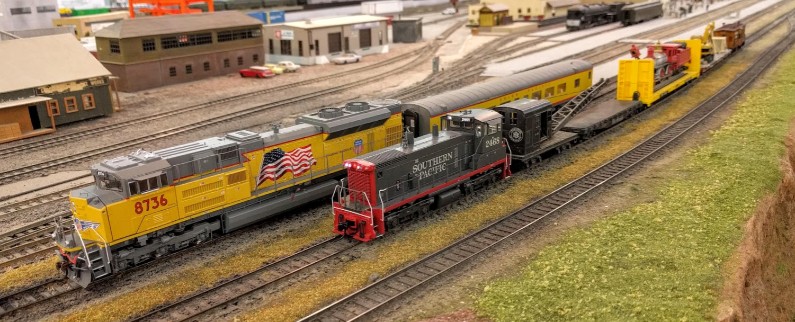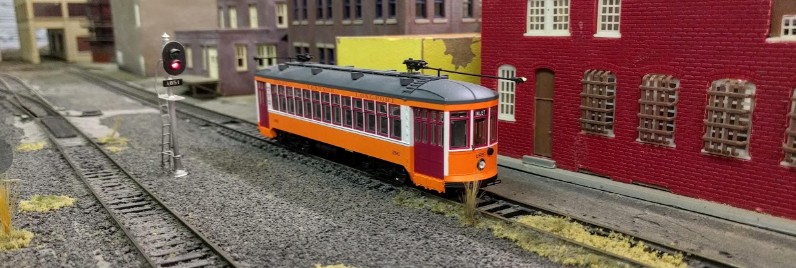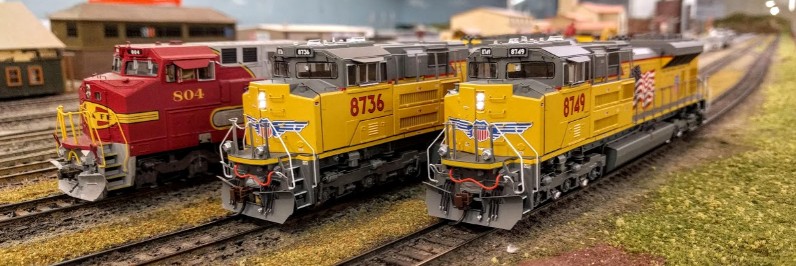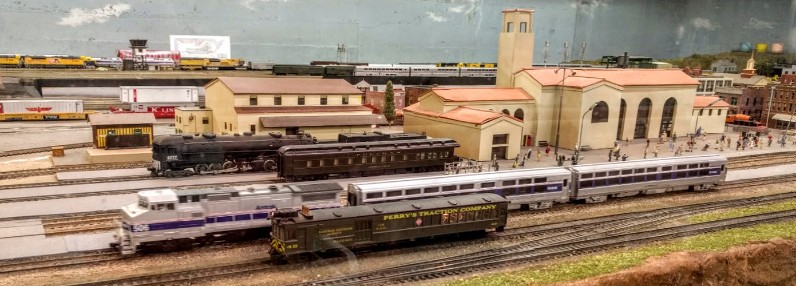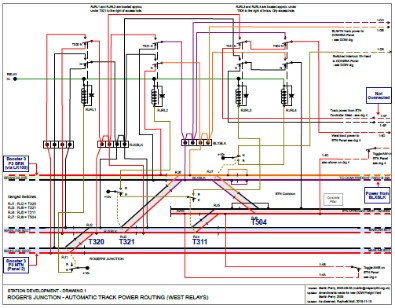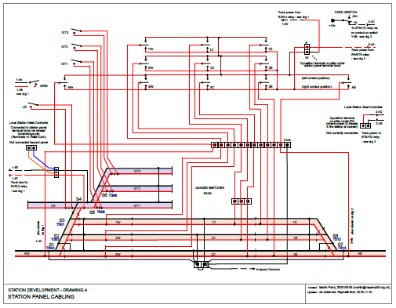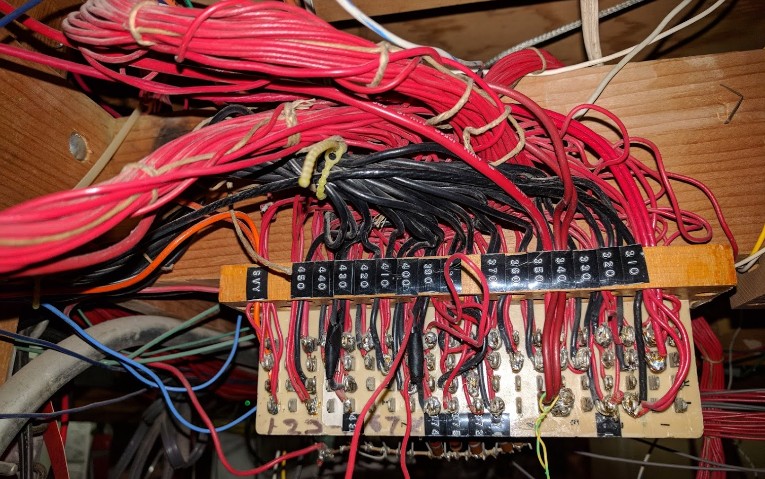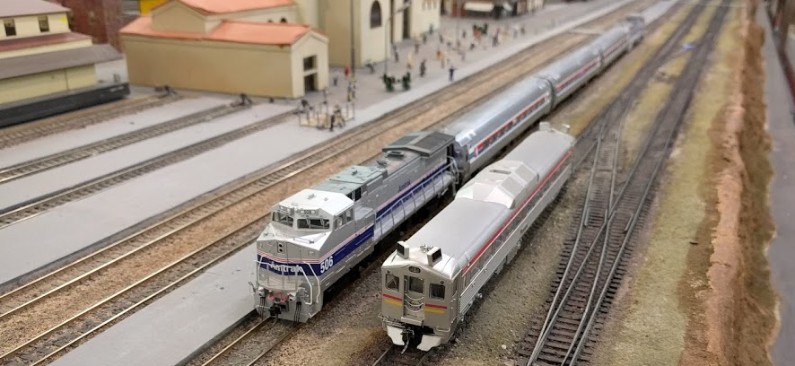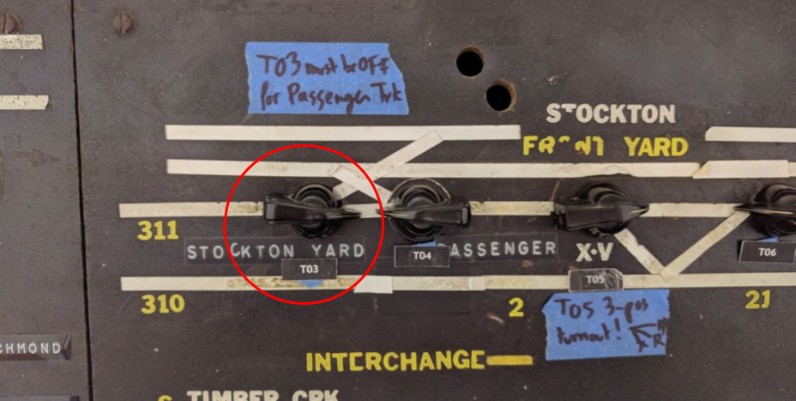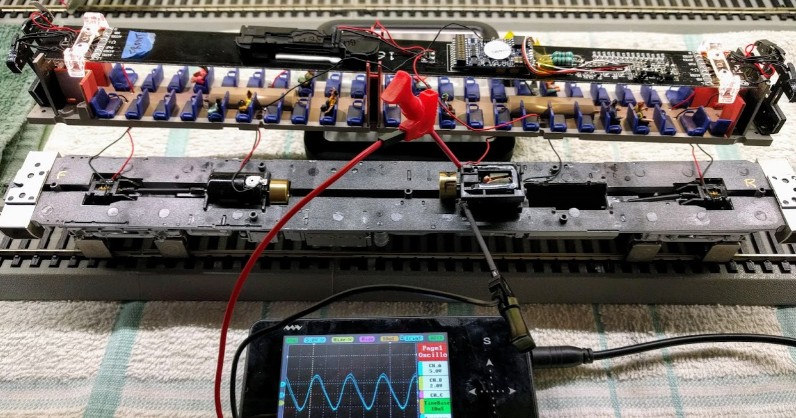The Randall Museum in San Francisco hosts a large HO-scale model model railroad. Created by the Golden Gate Model Railroad Club starting in 1961, the layout was donated to the Museum in 2015. Since then I have started automatizing trains running on the layout. I am also the model railroad maintainer. This blog describes various updates on the Randall project and I maintain a separate blog for all my electronics not directly related to Randall.
The Branchline mets the Mainline at a point named “Angel Camp”. Although we have the Rapido RDC stationed here, I thought it looked a bit empty. There are interchange tracks and a 3-tracks yard. So I added this today:
Click here to continue reading...
2018-12-21 - RDC Hide & Seek
Category RandallThe RDC stopped working today. Even when looking for it, we could not find it. It wasn’t at the station, it wasn’t stuck at the reversing block, and it was on no other part of the Branchline I could think of. After crawling under the layout and looking under the scenery and not finding it, I went back to the front of the layout and finally noticed this.
There’s a short tunnel at this place. On the other side is the canyon trestle bridge, and it’s nearly impossible to spot the engine in the tunnel from the other side’s angle. The amusing thing is that it fits nicely in this little short tunnel
The good part is that there was nothing visibly wrong with the Rapido engine and it started working just fine once I moved it somewhere else. Issue was just dirty track, as we had not cleaned that one in a little while, so I did scrub that a bit and then cleaned the engine wheels.
The main automated route operates two trains in alternance. We used to have an Amtrak GE engine with one coach car, and a Santa Fe pulling that little freight train.
Click here to continue reading...
Affected |
Turnout T161 (end of siding between Bridgeport & Sultan). |
Description |
Intermittent loss of power on frog. Eventually turnout motor stopped. |
Summary Fix |
Replaced Fulgurex motor by another one. |
Description of Issue
We’ve had engines stop-and-go on turnout T161 for several months, especially steam engines, or short non-MU engines. The turnout was always in the normal position when this happened.
The turnout is hard to access as it’s more than 3 feet away from fascia, and the only other access is above the adjacent mainline which partially covers the turnout motor.
Click here to continue reading...
Based on last week experimentation at Randall, here are a few more idea of automated routes, with a focus on what would be needed to make them happen. To be clear, none of this will happen any time soon, or even at all.
1- Trolley
Jim got this little trolley a while -- it is the Atlantic City from Bowser streetcar. We’re not using it yet and I can see two automation options:
Click here to continue reading...
The current mainline route is automated using an Amtrak Dash 8-32 for the passenger train and Santa Fe Dash 8-40 for the freight train. We have new power and I’m working on using it for the passenger train.
The original intent was to replicate the UP Special Train as they use it with Operation Lifesaver. However I am no longer keen to deal with the headaches of a push-pull setup so I’ll probably start with a very conservative and minimalist setup with just one engine and an UP coach. Jim got the dome car so we can expand later if it proves reliable.
In an ideal world, I’d place this train on track #2 in the station and we could alternate daily or so between Amtrak and UP for some variety. Unfortunately that turnout T311 that joins the station to the mainline has been giving me some troubles, which is the reason why our 3-coach train currently only has only one coach in automation.
The Stockton Station is certainly the most visible feature of the layout when visitors walk in the room and approach the middle of the room.
Last week, I wondered “Where does the power from the Stockton Passenger Station come from?”
Resolving that question took a full week, and was accomplished with the help of Mr. Perry who provided his extremely well detailed original schematics of the power routing to the station, which I turned into these schematics:
Click here to continue reading...
2018-11-04 - A Mountain of Wires
Category RandallHere’s an example of wiring under the layout. The next picture shows the block power leads out of the Mountain Panel. A bundle of red wires come from the panels, and another bundle of red wires goes to power the blocks on the mountain, and they all meet at this… thing. I’m going to call this an “interconnection board” for a lack of a better term:
The picture above doesn’t strike me as the best job ever. Now that would not seem too odd, except there are two issues here: first, one of the bundles of red wires just goes nowhere on the ground nearby, and second there’s a bundle of black wires coming in the picture. And do I see the black wires connected to the red wires? Yes I see that clearly.
Click here to continue reading...
So here’s an interesting problem: where does the power from the Stockton Passenger Station come from?
On this picture, the two rightmost tracks are mainline. Everything on the left is the Stockton Passenger Station. The Budd RDC is on the mainline whereas the Amtrak is on a passenger station track.
And then when the T03 turnout is set in reverse position on the mainline, the station loses power… Why?!
Click here to continue reading...
2018-09-29 - The RDC is back
Category RandallThe Rapido RDC SP 10 is back on the model railroad.
The engine had stopped working a month ago and it took some interesting amount of work to make it functional again.
Click here to continue reading...


